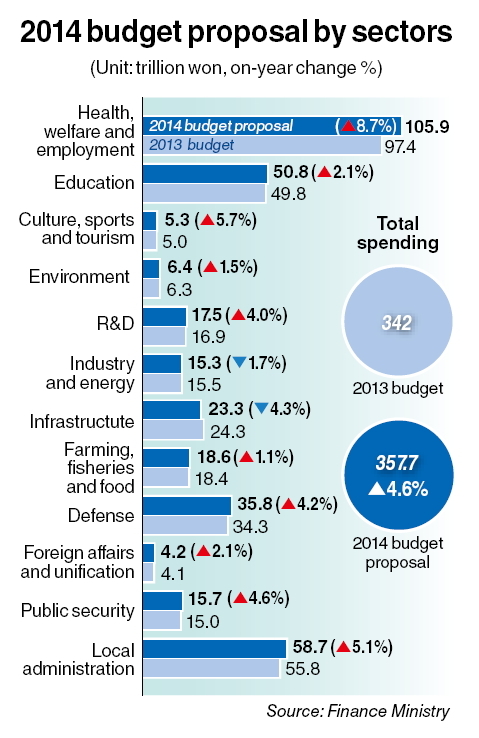Budget plan cuts some welfare pledges
Business lobbies welcome bill; opposition lawmakers demand drastic changes
By Kim Yon-sePublished : Sept. 26, 2013 - 20:53
The government’s budget proposal for next year is more focused on stimulating the economy than expanding social welfare, according to market observers in the political and business sectors on Thursday.
At a news briefing, Deputy Prime Minister and Finance Minister Hyun Oh-seok also admitted that the revised state policy has been set at scaling back its welfare increases and prioritizing economic growth.

The 2014 state budget proposal features expanding the state-policy funding by 24.3 trillion won ($22.1 billion) to boost corporate investment and creating 646,000 jobs by pouring in 2.8 trillion won.
“Though (the administration) should faithfully carry out presidential campaign pledges, we’ve revised down the spending plan on some welfare demands in reflection of the urgent policy to secure state funds through economic vitalization,” Hyun said.
The minister’s remarks indicate that the Park Geun-hye administration would adhere to its former stance of pursuing “welfare without tax hikes” for the wealthy and conglomerates.
While the business lobbies welcomed the budget proposal, opposition lawmakers criticized the administration for seeking not to anger the wealthy, the main supporters of the ruling Saenuri Party and President Park.
The Korea Chamber of Commerce and Industry said in a statement that it hopes that the National Assembly would pass the budget bill without amendment. The business lobby KCCI, in particular, positively evaluated the government’s plan to concentrate on investment and exports.
The Federation of Korean Industries also made similar comments on it, saying that it is a desirable direction as the government seems to take “the unfavorable economic conditions” into consideration.
But the main opposition Democratic Party heralded a strong demand for amendments during the coming National Assembly’s review and voting processes over the proposal.
The DP described it as a “falsehood budget,” stressing that it does not involve a spending plan to implement core presidential campaign pledges on welfare.
The party also argued that the nation will see its financial soundness further deteriorate as the sovereign debt is estimated to surge 50 trillion won in 2014 from the previous year under the proposal.
Last week, Finance Minister Hyun said the government should remain on alert since the U.S. Federal Reserve has sent a “strong signal” that Washington will soon start an exit strategy from quantitative easing.
“There is a positive aspect of less shock for emerging countries thanks to a delay in tapering,” he said. “However, we should stay cautious against future developments.”
Regarding the opposition parties’ demand for tax hikes on the rich and conglomerates, Hyun reiterated that policymakers would continue to put priority on legalizing the underground economy and scaling back non-taxation benefits, rather than raising taxes.
By Kim Yon-se (kys@heraldcorp.com)
At a news briefing, Deputy Prime Minister and Finance Minister Hyun Oh-seok also admitted that the revised state policy has been set at scaling back its welfare increases and prioritizing economic growth.

The 2014 state budget proposal features expanding the state-policy funding by 24.3 trillion won ($22.1 billion) to boost corporate investment and creating 646,000 jobs by pouring in 2.8 trillion won.
“Though (the administration) should faithfully carry out presidential campaign pledges, we’ve revised down the spending plan on some welfare demands in reflection of the urgent policy to secure state funds through economic vitalization,” Hyun said.
The minister’s remarks indicate that the Park Geun-hye administration would adhere to its former stance of pursuing “welfare without tax hikes” for the wealthy and conglomerates.
While the business lobbies welcomed the budget proposal, opposition lawmakers criticized the administration for seeking not to anger the wealthy, the main supporters of the ruling Saenuri Party and President Park.
The Korea Chamber of Commerce and Industry said in a statement that it hopes that the National Assembly would pass the budget bill without amendment. The business lobby KCCI, in particular, positively evaluated the government’s plan to concentrate on investment and exports.
The Federation of Korean Industries also made similar comments on it, saying that it is a desirable direction as the government seems to take “the unfavorable economic conditions” into consideration.
But the main opposition Democratic Party heralded a strong demand for amendments during the coming National Assembly’s review and voting processes over the proposal.
The DP described it as a “falsehood budget,” stressing that it does not involve a spending plan to implement core presidential campaign pledges on welfare.
The party also argued that the nation will see its financial soundness further deteriorate as the sovereign debt is estimated to surge 50 trillion won in 2014 from the previous year under the proposal.
Last week, Finance Minister Hyun said the government should remain on alert since the U.S. Federal Reserve has sent a “strong signal” that Washington will soon start an exit strategy from quantitative easing.
“There is a positive aspect of less shock for emerging countries thanks to a delay in tapering,” he said. “However, we should stay cautious against future developments.”
Regarding the opposition parties’ demand for tax hikes on the rich and conglomerates, Hyun reiterated that policymakers would continue to put priority on legalizing the underground economy and scaling back non-taxation benefits, rather than raising taxes.
By Kim Yon-se (kys@heraldcorp.com)










![[Hello India] Hyundai Motor vows to boost 'clean mobility' in India](http://res.heraldm.com/phpwas/restmb_idxmake.php?idx=644&simg=/content/image/2024/04/25/20240425050672_0.jpg&u=)








